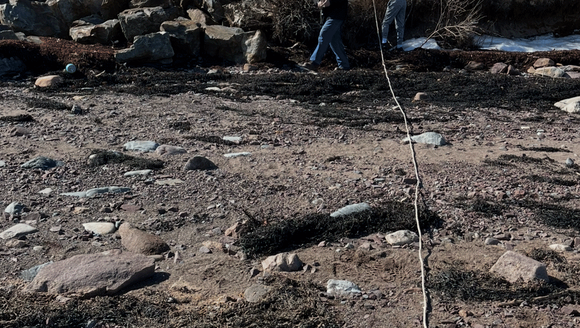Search: Programs and Projects
Results
-
![Rocky outcroppings into the Gulf of Maine shot from above with a drone.]()
Nutritional Ecology of Climate Change
The Gulf of Maine is rapidly warming, and many marine species are shifting northward or to deeper waters as temperatures increase. However, each species moves …
Science
-
![Several hands are pointing at a large map spread out across a table.]()
Offshore Wind Program
Our offshore wind program will provide interested stakeholders with the best available information about the risks, opportunities, and uncertainties associated with offshore wind development.
Science
-
![A man and a woman use a bright interactive touch screen in a dark room.]()
Community Resilience Training
In collaboration with Upswell, the Island Institute, and University of Maine RISE Center, we co-developed a process to move from climate knowledge to action through …
-
![MCAP hero thumbnail]()
Community Climate Action
We engage with coastal communities, combining local knowledge and expertise with the best available scientific data to envision — and realize — a climate-resilient and …
Community
-
![indigenouspartnerships_hero1]()
Indigenous Partnerships Program
We are privileged to learn through working closely with Indigenous communities and are now evolving a practice that prioritizes Indigenous knowledge and values and recognizes …
-
![coastal erosion indigenous partnerships]()
Coastal Erosion and Indigenous Resilience
Rising seas and eroding shorelines pose a growing threat to Indigenous lands and lifeways. This work supports tribal efforts to document and respond to coastal …
-
![This is a graphic with an icon in the middle that has a bunch of arrows pointing towards a boat in the middle, on a teal background.]()
Understanding Climate Impacts on Fisheries
Download reports using our interactive map to explore potential future climate impacts for your fishing community.
Science
-
![An aerial photo of Portland.]()
Urban Heat Island Mapping Project
Urban heat islands (UHIs) are urbanized areas that experience higher temperatures than outlying areas. Through already established protocols, we aim to support a comprehensive, community …
-
![This is a photo of a school lunch on a blue tray with colorful veggies and seafood.]()
Sea to School
One of our sustainable seafood team’s goals is to increase the amount of local seafood served in public school cafeterias across New England. This work …
Community
-
![Fishermen and women are listening to speaker in an interactive room.]()
Fisheries Engagement Program
Our Fisheries Engagement Program provides a range of technical, convening, and innovation services to New England's commercial fishing industry to promote the long-term prosperity of …
Community

Nutritional Ecology of Climate Change
The Gulf of Maine is rapidly warming, and many marine species are shifting northward or to deeper waters as temperatures increase. However, each species moves …
Science

Offshore Wind Program
Our offshore wind program will provide interested stakeholders with the best available information about the risks, opportunities, and uncertainties associated with offshore wind development.
Science

Community Resilience Training
In collaboration with Upswell, the Island Institute, and University of Maine RISE Center, we co-developed a process to move from climate knowledge to action through …

Community Climate Action
We engage with coastal communities, combining local knowledge and expertise with the best available scientific data to envision — and realize — a climate-resilient and …
Community

Indigenous Partnerships Program
We are privileged to learn through working closely with Indigenous communities and are now evolving a practice that prioritizes Indigenous knowledge and values and recognizes …

Coastal Erosion and Indigenous Resilience
Rising seas and eroding shorelines pose a growing threat to Indigenous lands and lifeways. This work supports tribal efforts to document and respond to coastal …

Understanding Climate Impacts on Fisheries
Download reports using our interactive map to explore potential future climate impacts for your fishing community.
Science

Urban Heat Island Mapping Project
Urban heat islands (UHIs) are urbanized areas that experience higher temperatures than outlying areas. Through already established protocols, we aim to support a comprehensive, community …

Sea to School
One of our sustainable seafood team’s goals is to increase the amount of local seafood served in public school cafeterias across New England. This work …
Community

Fisheries Engagement Program
Our Fisheries Engagement Program provides a range of technical, convening, and innovation services to New England's commercial fishing industry to promote the long-term prosperity of …
Community